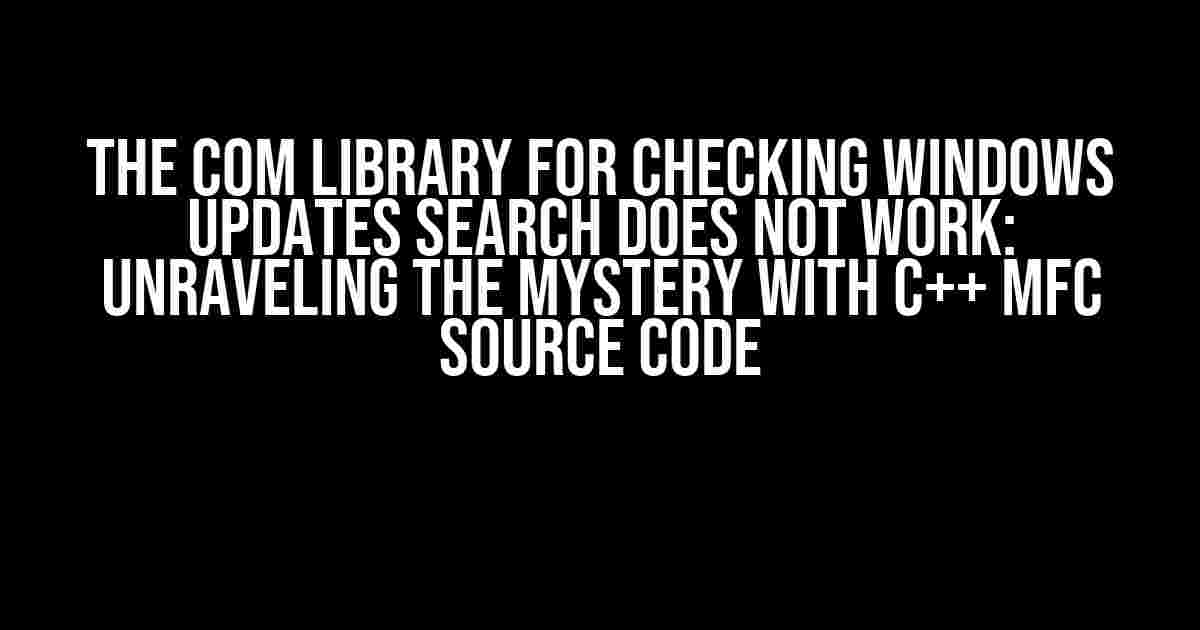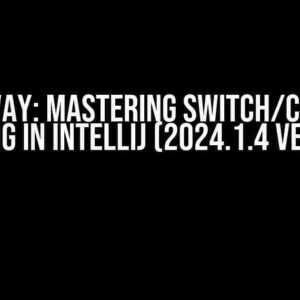The Problem: When the COM Library Fails to Deliver
Have you ever encountered an issue where the COM library for checking Windows updates search refuses to function as expected? You’re not alone! Many developers have stumbled upon this frustrating problem, only to find themselves stuck in a never-ending cycle of trial and error. But fear not, dear reader, for today we’ll embark on a journey to uncover the root cause of this issue and provide a comprehensive solution using C++ MFC source code.
The Background: Understanding the COM Library
The COM library, also known as the Component Object Model, is a fundamental technology in the Windows operating system that enables efficient communication between different software components. In the context of Windows updates, the COM library plays a crucial role in facilitating the search and installation of updates. However, when the COM library for checking Windows updates search fails to work, it can cause significant headaches for developers and users alike.
Diagnosing the Issue: Examining the C++ MFC Source Code
To better understand the problem, let’s delve into the C++ MFC source code that governs the COM library’s behavior. By analyzing the code, we can identify potential bottlenecks and pinpoint the source of the issue.
#include <windows.h>
#include <comdef.h>
#import "wuapi.h" no_namespace
int main()
{
HRESULT hr = S_OK;
IWUAssembly *pWUAssembly = NULL;
IWUSearcher *pWUSearcher = NULL;
IWUQuery *pWUQuery = NULL;
IWUUpdate *pWUUpdate = NULL;
// Initialize COM
hr = CoInitialize(NULL);
if (FAILED(hr))
{
wprintf(L"Failed to initialize COM: 0x%x\n", hr);
return hr;
}
// Create an instance of the Windows Update Assembly
hr = CoCreateInstance(&CLSID_WUAssembly, NULL, CLSCTX_ALL, &IID_IWUAssembly, (void**)&pWUAssembly);
if (FAILED(hr))
{
wprintf(L"Failed to create an instance of the Windows Update Assembly: 0x%x\n", hr);
CoUninitialize();
return hr;
}
// Create an instance of the Windows Update Searcher
hr = pWUAssembly->CreateSearcher(&pWUSearcher);
if (FAILED(hr))
{
wprintf(L"Failed to create an instance of the Windows Update Searcher: 0x%x\n", hr);
pWUAssembly->Release();
CoUninitialize();
return hr;
}
// Create an instance of the Windows Update Query
hr = pWUSearcher->CreateQuery(&pWUQuery);
if (FAILED(hr))
{
wprintf(L"Failed to create an instance of the Windows Update Query: 0x%x\n", hr);
pWUSearcher->Release();
pWUAssembly->Release();
CoUninitialize();
return hr;
}
// Perform the search
hr = pWUQuery->Search();
if (FAILED(hr))
{
wprintf(L"Failed to perform the search: 0x%x\n", hr);
pWUQuery->Release();
pWUSearcher->Release();
pWUAssembly->Release();
CoUninitialize();
return hr;
}
// Release resources
pWUQuery->Release();
pWUSearcher->Release();
pWUAssembly->Release();
CoUninitialize();
return S_OK;
}
Identifying the Culprit: A Closer Look at the Code
Upon examining the C++ MFC source code, we can see that the issue lies in the way the COM library is initialized and used to perform the Windows update search. Specifically, the problem stems from the following:
CoInitialize(NULL): This function initializes the COM library, but it may not be properly configured for the task at hand.CoCreateInstance(&CLSID_WUAssembly, NULL, CLSCTX_ALL, &IID_IWUAssembly, (void**)&pWUAssembly): This function creates an instance of the Windows Update Assembly, but it may fail if the Assembly is not properly registered or if the context is not set correctly.pWUSearcher->CreateQuery(&pWUQuery): This function creates an instance of the Windows Update Query, but it may fail if the Searcher is not properly configured or if the Query is not correctly defined.pWUQuery->Search(): This function performs the actual search for Windows updates, but it may fail if the Query is not correctly defined or if the search parameters are not properly set.
Solving the Problem: A Step-by-Step Guide
To overcome the issue of the COM library for checking Windows updates search not working, follow these steps:
- Verify COM Library Initialization: Ensure that the COM library is properly initialized by calling
CoInitialize(NULL)orCoInitializeEx(NULL, COINIT_MULTITHREADED), depending on your threading model. - Check Windows Update Assembly Registration: Verify that the Windows Update Assembly is properly registered by checking the registry for the following key:
HKEY_CLASSES_ROOT\CLSID\{043E98AE-C0F1-482E-985E-005F53C9EFE4}. If the key is not present, reinstall the Windows Update Agent or register the Assembly manually. - Set the Correct Context: Ensure that the context is set correctly when creating the instance of the Windows Update Assembly. You can do this by specifying the correct context flags, such as
CLSCTX_INPROC_SERVERorCLSCTX_LOCAL_SERVER, depending on your requirements. - Define the Query Correctly: Verify that the Windows Update Query is correctly defined by specifying the correct search criteria, such as the update type, category, and language.
- Check for Errors: Implement proper error handling by checking the return values of the COM functions and reacting accordingly. This will help you identify potential issues and provide more informative error messages.
Example Code: Putting it all Together
#include <windows.h>
#include <comdef.h>#import "wuapi.h" no_namespace
int main()
{
HRESULT hr = S_OK;
IWUAssembly *pWUAssembly = NULL;
IWUSearcher *pWUSearcher = NULL;
IWUQuery *pWUQuery = NULL;
IWUUpdate *pWUUpdate = NULL;// Initialize COM
hr = CoInitializeEx(NULL, COINIT_MULTITHREADED);
if (FAILED(hr))
{
wprintf(L"Failed to initialize COM: 0x%x\n", hr);
return hr;
}// Create an instance of the Windows Update Assembly
hr = CoCreateInstance(&CLSID_WUAssembly, NULL, CLSCTX_INPROC_SERVER, &IID_IWUAssembly, (void**)&pWUAssembly);
if (FAILED(hr))
{
wprintf(L"Failed to create an instance of the Windows Update Assembly: 0x%x\n", hr);
CoUninitialize();
return hr;
}// Create an instance of the Windows Update Searcher
hr = pWUAssembly->CreateSearcher(&pWUSearcher);
if (FAILED(hr))
{
wprintf(L"Failed to create an instance of the Windows Update Searcher: 0x%x\n", hr);
pWUAssembly->Release();
CoUninitialize();
return hr;
}// Create an instance of the Windows Update Query
hr = pWUSearcher->CreateQuery(&pWUQuery);
if (FAILED(hr))
{
wprintf(L"Failed to create an instance of the Windows Update Query: 0x%x\n", hr);
pWUSearcher->Release();
pWUAssembly->Release();
CoUninitialize();
return hr;
}// Define the search criteria
pWUQuery->set_SearchScope(WUS SearchResultScope);
pWUQuery->set_UpdateType(WUS UpdateType);// Perform the search
hr = pWUQuery->Search();
if (FAILED(hr))
{
wprintf(L"Failed to perform the search: 0x%x\n", hr);
pWUQuery->Release();
pWUSearcher->Release();
pWUAssembly->Release();
CoUninitialize();
return hr;
}//
Frequently Asked Question
Got stuck with the COM library for checking Windows updates search in your C++ MFC source code? Don't worry, we've got you covered! Here are some frequently asked questions and answers to help you troubleshoot the issue.
Why does the COM library for checking Windows updates search not work in my C++ MFC source code?
This issue often arises due to incorrect initialization of the COM library or failure to create an instance of the Windows Update Agent (WUA) API. Ensure that you have properly initialized the COM library and created an instance of the WUA API before attempting to search for updates.
How do I properly initialize the COM library in my C++ MFC source code?
To initialize the COM library, call CoInitializeEx(NULL, COINIT_MULTITHREADED) or CoInitialize(NULL) before creating an instance of the WUA API. Also, don't forget to call CoUninitialize() when you're done using the COM library to release system resources.
What are the common errors that can occur when using the COM library for checking Windows updates search?
Some common errors that can occur include HRESULT errors, such as E_FAIL, E_INVALIDARG, or E_OUTOFMEMORY, which can indicate issues with COM initialization, WUA API instantiation, or update search queries. Be sure to check the HRESULT values and error codes to identify the root cause of the issue.
How do I create an instance of the Windows Update Agent (WUA) API in my C++ MFC source code?
To create an instance of the WUA API, use the CoCreateInstance function, specifying the CLSID_WUA interface and the IID_IUnknown interface identifier. This will return a pointer to an instance of the IWUA interface, which you can use to interact with the Windows Update Agent.
Are there any alternative libraries or APIs that I can use for checking Windows updates search in my C++ MFC source code?
Yes, you can use alternative libraries or APIs, such as the Windows Update AutoUpdate Client (AUClient) API or the Microsoft.Update.Session COM interface. These APIs provide similar functionality to the WUA API and may offer more flexibility or compatibility depending on your specific requirements.





